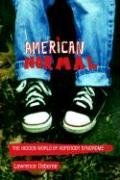Search -
American Normal
American Normal
Author:
Thomas Jefferson may have had it. The pianist Glenn Gould almost certainly had it. There are even those who insist (probably incorrectly) that Albert Einstein had it. Whether it is called "geek syndrome," "high-functioning autism," or simply "Asperger's," it is not just one of the most poorly understood of all neurological disorders, but amazing... more »
Author:
Thomas Jefferson may have had it. The pianist Glenn Gould almost certainly had it. There are even those who insist (probably incorrectly) that Albert Einstein had it. Whether it is called "geek syndrome," "high-functioning autism," or simply "Asperger's," it is not just one of the most poorly understood of all neurological disorders, but amazing... more »
ISBN-13: 9780387953076
ISBN-10: 0387953078
Publication Date: 10/4/2002
Pages: 224
Rating: 1
ISBN-10: 0387953078
Publication Date: 10/4/2002
Pages: 224
Rating: 1
1 stars, based on 1 rating
Genres:
- Health, Fitness & Dieting >> Psychology & Counseling >> General
- Health, Fitness & Dieting >> Psychology & Counseling >> Mental Illness
- Parenting & Relationships >> General
- Science & Math >> General
- Medicine >> Specialties >> Psychiatry >> General
- Medical Books >> Medicine >> Internal Medicine >> Psychiatry




